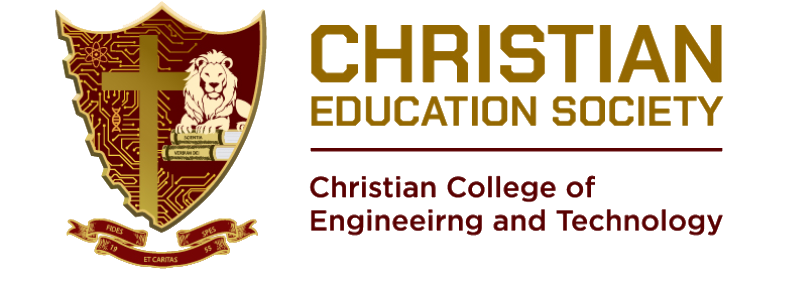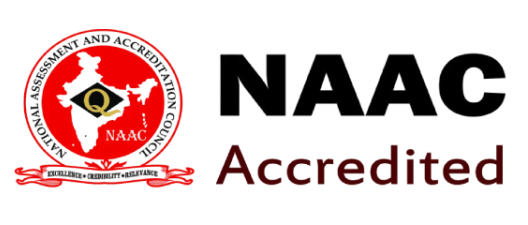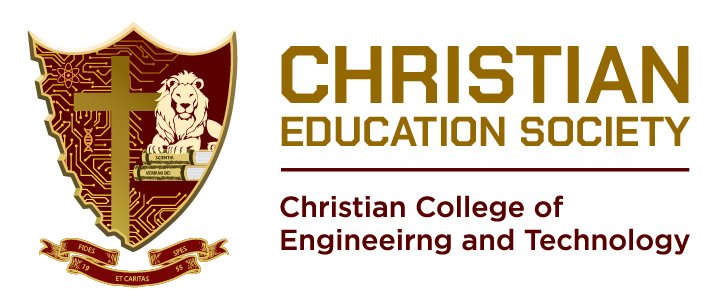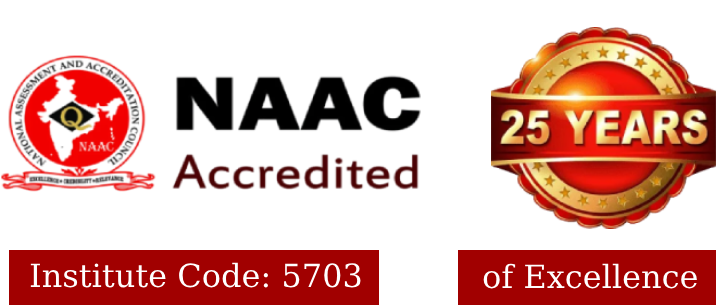Artificial Intelligence and Data Science
Introduction
Welcome to the Department of Artificial Intelligence and Data science. The department was established in the Christian College of Engineering and Technology in 2023. The Department was started with the intake of 30 students. This program is permanently affiliated by Anna University. Our department follows the Anna university curriculum and we have qualified faculties.
Vision
To harness the power of Artificial Intelligence and Data Science to drive innovation, transformation, and growth, while fostering a culture of ethics, responsibility and inclusivity with the quality education, industry collaboration, promote research to serve the society.
Mission
- To empower organizations and individuals to make informed data-driven decisions that drive growth, efficiency, and sustainability.
- To enhance in Attracting, developing, and retaining top AI and data science talent, and fostering a culture of continuous learning and innovation.
- To enhance in Attracting, developing, and retaining top AI and data science talent, and fostering a culture of continuous learning and innovation
Programme Educational Objectives (PEO’s)
- Utilize their proficiencies in the fundamental knowledge of basic sciences, mathematics, Artificial Intelligence, data science and statistics to build systems that require management and analysis of large volumes of data.
- Advance their technical skills to pursue pioneering research in the field of AI and Data Science and create disruptive and sustainable solutions for the welfare of ecosystems.
- Think logically, pursue lifelong learning and collaborate with an ethical attitude in a multidisciplinary team.
- Design and model AI based solutions to critical problem domains in the real world.
- Exhibit innovative thoughts and creative ideas for effective contribution towards economy building.
PROGRAM OUTCOMES (POs)
Engineering knowledge: Apply the knowledge of mathematics, science, engineering fundamentals, and an engineering specialization to the solution of complex engineering problems
.
Problem analysis: Identify, formulate, review research literature, and analyze complex engineering problems reaching substantiated conclusions using first principles of mathematics, natural sciences, and engineering sciences.
Design/development of solutions: Design solutions for complex engineering problems and design system components or processes that meet the specified needs with appropriate consideration for the public health and safety, and the cultural, societal, and environmental considerations.
Conduct investigations of complex problems: Use research-based knowledge and research methods including design of experiments, analysis and interpretation of data, and synthesis of the information to provide valid conclusions
Modern tool usage: Create, select, and apply appropriate techniques, resources, and modern engineering and IT tools including prediction and modeling to complex engineering activities with an understanding of the limitations.
The engineer and society: Apply reasoning informed by the contextual knowledge to assess societal, health, safety, legal and cultural issues and the consequent responsibilities relevant to the professional engineering practice.
Environment and sustainability: Understand the impact of the professional engineering
solutions in societal and environmental contexts, and demonstrate the knowledge of, and need for sustainable development.
Ethics: Apply ethical principles and commit to professional ethics and responsibilities and norms of the engineering practice.
Individual and team work: Function effectively as an individual, and as a member or leader in diverse teams, and in multidisciplinary settings.
Communication: Communicate effectively on complex engineering activities with the engineering community and with society at large, such as, being able to comprehend and write effective reports and design documentation, make effective presentations, and give and receive clear instructions.
Project management and finance: Demonstrate knowledge and understanding of the engineering and management principles and apply these to one’s own work, as a member and leader in a team, to manage projects and in multidisciplinary environments.
Life-long learning: Recognize the need for, and have the preparation and ability to engage in independent and life-long learning in the broadest context of technological change.
Program Specific Outcomes (PSO’s)
Graduates should be able to:
- Evolve AI based efficient domain specific processes for effective decision making in several domains such as business and governance domains.
- Arrive at actionable Foresight, Insight, hind sight from data for solving business and engineering problems.
- Create, select and apply the theoretical knowledge of AI and Data Analytics along with practical industrial tools and techniques to manage and solve wicked societal problems.
- Develop data analytics and data visualization skills, skills pertaining to knowledge acquisition, knowledge representation and knowledge engineering, and hence be capable of coordinating complex projects.
- Able to carry out fundamental research to cater the critical needs of the society through cutting edge technologies of AI.

Dr.C.SUNDAR, M.E.,P.hD.,
DEAN – RESEARCH,
Professor & Head,
Department of AIDS
Welcome to Department of AIDS, CCET.
Department of AIDS is well supported faculty members.. Our distinguished faculty teaches a wide range of diverse and engaging classes ranging from the fundamentals of Artificial Intelligence, Core Courses, Programming and Emerging Technologies like Data Science, Machine Learning, Professional Ethics, Research Methodologies. It is built with the state of art infrastructure facility to support and encourage students to acquire knowledge and practical experience. During the course, students are able to mold their career, polish their technical skills and also inculcate team spirit with good oral and written communication. Students are supported technically and financially to participate in competitions, Hackathons at state, national and international level platforms.
Sincerely with Best Wishes,
Dr.C.SUNDAR, M.E.,P.hD.,
DEAN – RESEARCH,
Professor & Head,
Department of AIDS.
Mail ID: csehod@christianengineering.in

Mrs.s. Angulakshmi ,
m.e,
Assistant Professor

Mrs.r.ramya,
m.e,
Assistant Professor
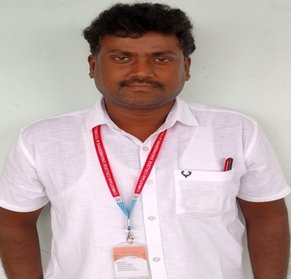
KANDAPIRABU K S
M.E CSE
Assistant Professor
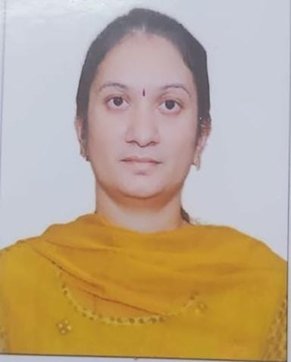
BALAPREETHY S
M.E CSE
Assistant Professor
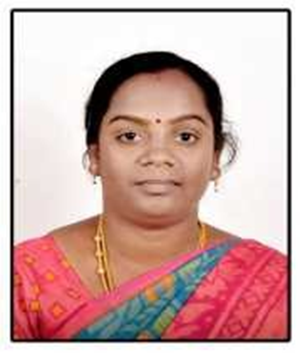
SARANYA M
M.E CSE
Assistant Professor
| HS3152 -PROFESSIONAL ENGLISH I – [C101] | ||||||
| C101.1 | To use appropriate words in a professional context | |||||
| C101.2 | To gain understanding of basic grammatic structures and use them in right context. | |||||
| C101.3 | To read and infer the denotative and connotative meanings of technical texts | |||||
| C101.4 | To write definitions, descriptions, narrations and essays on various topics | |||||
| MA3151- MATRICES AND CALCULUS – [C102] | ||||||
| C102.1 | Use the matrix algebra methods for solving practical problems. | |||||
| C102.2 | Apply differential calculus tools in solving various application problems. | |||||
| C102.3 | Able to use differential calculus ideas on several variable functions. | |||||
| C102.4 | Apply different methods of integration in solving practical problems. | |||||
| C102.5 | :Apply multiple integral ideas in solving areas, volumes and other practical problems. | |||||
| PH3151 -ENGINEERING PHYSICS – [C103] | ||||||
| C103.1 | Understand the importance of mechanics. | |||||
| C103.2 | Express their knowledge in electromagnetic waves. | |||||
| C103.3 | Demonstrate a strong foundational knowledge in oscillations, optics and lasers. | |||||
| C103.4 | Understand the importance of quantum physics. | |||||
| C103.5 | Comprehend and apply quantum mechanical principles towards the formation of energy bands. | |||||
| CY3151 – ENGINEERING CHEMISTRY – [C104] | ||||||
| C104.1 | To infer the quality of water from quality parameter data and propose suitable treatment methodologies to treat water. | |||||
| C104.2 | To identify and apply basic concepts of nanoscience and nanotechnology in designing the synthesis of nanomaterials for engineering and technology applications. | |||||
| C104.3 | To apply the knowledge of phase rule and composites for material selection requirements. | |||||
| C104.4 | To recommend suitable fuels for engineering processes and applications. | |||||
| C104.5 | To recognize different forms of energy resources and apply them for suitable applications in energy sectors. | |||||
| GE3151- PROBLEM SOLVING AND PYTHON PROGRAMMING – [C105] | ||||||
| C105.1 | Develop algorithmic solutions to simple computational problems. | |||||
| C105.2 | Develop and execute simple Python programs. | |||||
| C105.3 | Write simple Python programs using conditionals and loops for solving problems. | |||||
| C105.4 | Decompose a Python program into functions. | |||||
| C105.5 | Represent compound data using Python lists, tuples, dictionaries etc. | |||||
| C105.6 | Read and write data from/to files in Python programs. | |||||
| GE3152 – HERITAGE OF TAMILS – [C106] | ||||||
| C106.1 | ||||||
| C106.2 | ||||||
| C106.3 | ||||||
| C106.4 | ||||||
| C106.5 | ||||||
| GE3171 – PROBLEM SOLVING AND PYTHON PROGRAMMING LABORATORY – [C107] | ||||||
| C107.1 | Develop algorithmic solutions to simple computational problems | |||||
| C107.2 | Develop and execute simple Python programs. | |||||
| C107.3 | Implement programs in Python using conditionals and loops for solving problems.. | |||||
| C107.4 | Deploy functions to decompose a Python program. | |||||
| C107.5 | Process compound data using Python data structures. | |||||
| C107.6 | Utilize Python packages in developing software applications. | |||||
| BS3171 – PHYSICS AND CHEMISTRY LABORATORY – [C108a] | ||||||
| C108.a.1 | Understand the functioning of various physics laboratory equipment. | |||||
| C108.a.2 | Use graphical models to analyze laboratory data. | |||||
| C108.a.3 | Use mathematical models as a medium for quantitative reasoning and describing physical reality. | |||||
| C108.a.4 | Access, process and analyze scientific information. | |||||
| C108.a.5 | Solve problems individually and collaboratively. | |||||
| CHEMISTRY LABORATORY – [C108b] | ||||||
| C108.b.1 | To analyse the quality of water samples with respect to their acidity, alkalinity, hardness and DO. | |||||
| C108.b.2 | To determine the amount of metal ions through volumetric and spectroscopic techniques | |||||
| C108.b.3 | To analyse and determine the composition of alloys. | |||||
| C108.b.4 | To learn simple method of synthesis of nanoparticles | |||||
| C108.b.5 | To quantitatively analyse the impurities in solution by electroanalytical techniques | |||||
| GE3172 – ENGLISH LABORATORY – [C109] | ||||||
| C109.1 | To listen to and comprehend general as well as complex academic information | |||||
| C109.2 | To listen to and understand different points of view in a discussion | |||||
| C109.3 | To speak fluently and accurately in formal and informal communicative contexts | |||||
| C109.4 | To describe products and processes and explain their uses and purposes clearly and accurately | |||||
| C109.5 | To express their opinions effectively in both formal and informal discussions | |||||
| HS3252- PROFESSIONAL ENGLISH – II – [C110] | ||||||
| C110.1 | To compare and contrast products and ideas in technical texts. | |||||
| C110.2 | To identify and report cause and effects in events, industrial processes through technical texts | |||||
| C110.3 | To analyse problems in order to arrive at feasible solutions and communicate them in the written format. | |||||
| C110.4 | To present their ideas and opinions in a planned and logical manner | |||||
| C110.5 | To draft effective resumes in the context of job search. | |||||
| MA3251 -STATISTICS AND NUMERICAL METHODS – [C111] | ||||||
| C111.1 | Apply the concept of testing of hypothesis for small and large samples in real life problems. | |||||
| C111.2 | Apply the basic concepts of classifications of design of experiments in the field of agriculture. | |||||
| C111.3 | Appreciate the numerical techniques of interpolation in various intervals and apply the numerical techniques of differentiation and integration for engineering problems. | |||||
| C111.4 | Understand the knowledge of various techniques and methods for solving first and second order ordinary differential equations. | |||||
| C111.5 | Solve the partial and ordinary differential equations with initial and boundary conditions by using certain techniques with engineering applications. | |||||
| PH3256 – PHYSICS FOR INFORMATION SCIENCE – [C112] | ||||||
| C112.1 | gain knowledge on classical and quantum electron theories, and energy band structures | |||||
| C112.2 | acquire knowledge on basics of semiconductor physics and its applications in various devices | |||||
| C112.3 | get knowledge on magnetic properties of materials and their applications in data storage | |||||
| C112.4 | have the necessary understanding on the functioning of optical materials for optoelectronics | |||||
| C112.5 | understand the basics of quantum structures and their applications and basics of quantum computing | |||||
| BE3251 – BASIC ELECTRICAL AND ELECTRONICS ENGINEERING – [C113] | ||||||
| C113.1 | Compute the electric circuit parameters for simple problems | |||||
| C113.2 | Explain the working principle and applications of electrical machines | |||||
| C113.3 | Analyze the characteristics of analog electronic devices | |||||
| C113.4 | Explain the basic concepts of digital electronics | |||||
| C113.5 | Explain the operating principles of measuring instruments | |||||
| GE3251 – ENGINEERING GRAPHICS – [C114] | ||||||
| C114.1 | Use BIS conventions and specifications for engineering drawing. | |||||
| C114.2 | Construct the conic curves, involutes and cycloid. | |||||
| C114.3 | Solve practical problems involving projection of lines. | |||||
| C114.4 | Draw the orthographic, isometric and perspective projections of simple solids. | |||||
| C114.5 | Draw the development of simple solids. | |||||
| CS3251 – PROGRAMMING IN C – [C115] | ||||||
| C115.1 | Explain circuit’s behavior using circuit laws. | |||||
| C115.2 | Apply mesh analysis/ nodal analysis / network theorems to determine behavior of the given DC and AC circuit | |||||
| C115.3 | Compute the transient response of first order and second order systems to step and sinusoidal input | |||||
| C115.4 | Compute power, line/ phase voltage and currents of the given three phase circuit | |||||
| C115.5 | Explain the frequency response of series and parallel RLC circuits | |||||
| C115.6 | Explain the behavior of magnetically coupled circuits. | |||||
| GE3252 – TAMILS AND TECHNOLOGY – [C116] | ||||||
| C116.1 | ||||||
| C116.2 | ||||||
| C116.3 | ||||||
| C116.4 | ||||||
| C116.5 | ||||||
| GE3271 – ENGINEERING PRACTICES LABORATORY – [C117] | ||||||
| C117.1 | :Draw pipe line plan; lay and connect various pipe fittings used in common household plumbing work; Saw; plan; make joints in wood materials used in common household wood work. | |||||
| C117.2 | Wire various electrical joints in common household electrical wire work. | |||||
| C117.3 | Weld various joints in steel plates using arc welding work; Machine various simple processes like turning, drilling, tapping in parts; Assemble simple mechanical assembly of common household equipments; Make a tray out of metal sheet using sheet metal work. | |||||
| C117.4 | :Solder and test simple electronic circuits; Assemble and test simple electronic components on PCB. | |||||
| CS3271 – PROGRAMMING IN C LABORATORY – [C118] | ||||||
| C118.1 | Demonstrate knowledge on C programming constructs | |||||
| C118.2 | Develop programs in C using basic constructs. | |||||
| C118.3 | Develop programs in C using arrays. | |||||
| C118.4 | Develop applications in C using strings, pointers, functions | |||||
| C118.5 | Develop applications in C using structures. | |||||
| C118.6 | Develop applications in C using file processing | |||||
| GE3272 – COMMUNICATION LABORATORY – [C119] | ||||||
| C119.1 | To listen to and comprehend general as well as complex academic information | |||||
| C119.2 | To listen to and understand different points of view in a discussion | |||||
| C119.3 | To speak fluently and accurately in formal and informal communicative contexts | |||||
| C119.4 | To describe products and processes and explain their uses and purposes clearly and accurately | |||||
| C119.5 | To express their opinions effectively in both formal and informal discussions | |||||
| MA3354 -DISCRETE MATHEMATICS – [C201] | ||||||
| C201.1 | Have knowledge of the concepts needed to test the logic of a program. | |||||
| C201.2 | Have an understanding in identifying structures on many levels. | |||||
| C201.3 | Be aware of a class of functions which transform a finite set into another finite set which relates to input and output functions in computer science | |||||
| C201.4 | Be aware of the counting principles. | |||||
| C201.5 | Be exposed to concepts and properties of algebraic structures such as groups, rings and fields. | |||||
| CS3351 – DIGITAL PRINCIPLES AND COMPUTER ORGANIZATION – [C202] | ||||||
| C202.1 | Design various combinational digital circuits using logic gates | |||||
| C202.2 | Design sequential circuits and analyze the design procedures | |||||
| C202.3 | State the fundamentals of computer systems and analyze the execution of an instruction | |||||
| C202.4 | Analyze different types of control design and identify hazards | |||||
| C202.5 | Identify the characteristics of various memory systems and I/O communication | |||||
| CS3352- FOUNDATIONS OF DATA SCIENCE – [C203] | ||||||
| C203.1 | Define the data science process | |||||
| C203.2 | Understand different types of data description for data science process | |||||
| C203.3 | Gain knowledge on relationships between data | |||||
| C203.4 | Use the Python Libraries for Data Wrangling | |||||
| C203.5 | Apply visualization Libraries in Python to interpret and explore data | |||||
| CD3291 – DATA STRUCTURES AND ALGORITHMS – [C204] | ||||||
| C204.1 | Explain abstract data types | |||||
| C204.2 | Design, implement, and analyze linear data structures, such as lists, queues, and stacks, according to the needs of different applications | |||||
| C204.3 | Design, implement, and analyze efficient tree structures to meet requirements such as searching, indexing, and sorting | |||||
| C204.4 | Model problems as graph problems and implement efficient graph algorithms to solve them | |||||
| CS3391 – OBJECT ORIENTED PROGRAMMING – [C205] | ||||||
| C205.1 | Apply the concepts of classes and objects to solve simple problems | |||||
| C205.2 | Develop programs using inheritance, packages and interfaces | |||||
| C205.3 | Make use of exception handling mechanisms and multithreaded model to solve real world problems | |||||
| C205.4 | Compute various performance parameters of the machine, by conducting suitable tests. | |||||
| C205.5 | Build Java applications with I/O packages, string classes, Collections and generics concepts | |||||
| C205.6 | Integrate the concepts of event handling and JavaFX components and controls for developing GUI based applications | |||||
| CD3281 – DATA STRUCTURES AND ALGORITHMS LABORATORY – [C206] | ||||||
| C206.1 | Design, implement, and analyse linear data structures, such as lists, queues, and stacks, according to the needs of different applications | |||||
| C206.2 | Write functions to implement linear and non–linear data structure operations. | |||||
| C206.3 | Design, implement, and analyse efficient tree structures to meet requirements such as searching, indexing, and sorting | |||||
| C206.4 | Appropriately use sort and search algorithms for a given application. | |||||
| CS3381 – OBJECT ORIENTED PROGRAMMING LABORATORY – [C207] | ||||||
| C207.1 | Design and develop java programs using object oriented programming concepts | |||||
| C207.2 | Develop simple applications using object oriented concepts such as package, exceptions | |||||
| C207.3 | Implement multithreading, and generics concepts | |||||
| C207.4 | Create GUIs and event driven programming applications for real world problems | |||||
| C207.5 | Implement and deploy web applications using Java | |||||
| CS3361 – DATA SCIENCE LABORATORY – [C208] | ||||||
| C208.1 | Make use of the python libraries for data science | |||||
| C208.2 | Make use of the basic Statistical and Probability measures for data science | |||||
| C208.3 | Perform descriptive analytics on the benchmark data sets. | |||||
| C208.4 | Perform correlation and regression analytics on standard data sets | |||||
| C208.5 | Present and interpret data using visualization packages in Python. | |||||
| GE3361 -PROFESSIONAL DEVELOPMENT – [C209] | ||||||
| C209.1 | Use MS Word to create quality documents, by structuring and organizing content for their day to day technical and academic requirements | |||||
| C209.2 | Use MS EXCEL to perform data operations and analytics, record, retrieve data as per requirements and visualize data for ease of understanding | |||||
| C209.3 | Use MS PowerPoint to create high quality academic presentations by including common tables, charts, graphs, interlinking other elements, and using media objects | |||||
| CS3452 – THEORY OF COMPUTATION – [C211] | ||||||
| C211.1 | Construct automata theory using Finite Automata | |||||
| C211.2 | Write regular expressions for any pattern | |||||
| C211.3 | Design context free grammar and Pushdown Automata | |||||
| C211.4 | Design Turing machine for computational functions | |||||
| C211.5 | Differentiate between decidable and undecidable problems | |||||
| CS3491 – ARTIFICIAL INTELLIGENCE AND MACHINE LEARNING – [C212] | ||||||
| C212.1 | Use appropriate search algorithms for problem solving | |||||
| C212.2 | Apply reasoning under uncertainty | |||||
| C212.3 | Build supervised learning models | |||||
| C212.4 | Build ensembling and unsupervised models | |||||
| C212.5 | Build deep learning neural network models | |||||
| CS3492 – DATABASE MANAGEMENT SYSTEMS – [C213] | ||||||
| C213.1 | Construct SQL Queries using relational algebra | |||||
| C213.2 | Design database using ER model and normalize the database | |||||
| C213.3 | Construct queries to handle transaction processing and maintain consistency of the database | |||||
| C213.4 | Compare and contrast various indexing strategies and apply the knowledge to tune the performance of the database | |||||
| C213.5 | Appraise how advanced databases differ from Relational Databases and find a suitable database for the given requirement. | |||||
| I T3401 – WEB ESSENTIALS – [C214] | ||||||
| C214.1 | Apply JavaScript, HTML and CSS effectively to create interactive and dynamic websites | |||||
| C214.2 | Create simple PHP scripts | |||||
| C214.3 | Design and deploy simple web-applications. | |||||
| C214.4 | Create simple database applications | |||||
| C214.5 | Handle multimedia components | |||||
| CS3451 – INTRODUCTION TO OPERATING SYSTEMS – [C215] | ||||||
| C215.1 | Analyze various scheduling algorithms and process synchronization | |||||
| C215.2 | Explain deadlock prevention and avoidance algorithms. | |||||
| C215.3 | Compare and contrast various memory management schemes. | |||||
| C215.4 | Explain the functionality of file systems, I/O systems, and Virtualization | |||||
| C215.5 | Compare iOS and Android Operating Systems. | |||||
| GE3451 -ENVIRONMENTAL SCIENCES AND SUSTAINABILITY – [C216] | ||||||
| C216.1 | To recognize and understand the functions of environment, ecosystems and biodiversity and their conservation. | |||||
| C216.2 | To identify the causes, effects of environmental pollution and natural disasters and contribute to the preventive measures in the society. | |||||
| C216.3 | To identify and apply the understanding of renewable and non-renewable resources and contribute to the sustainable measures to preserve them for future generations. | |||||
| C216.4 | To recognize the different goals of sustainable development and apply them for suitable technological advancement and societal development. | |||||
| C216.5 | To demonstrate the knowledge of sustainability practices and identify green materials, energy cycles and the role of sustainable urbanization. | |||||
| CS3461 – OPERATING SYSTEMS LABORATORY – [C217] | ||||||
| C217.1 | Define and implement UNIX Commands. | |||||
| C217.2 | Compare the performance of various CPU Scheduling Algorithms. | |||||
| C217.3 | Compare and contrast various Memory Allocation Methods. | |||||
| C217.4 | Define File Organization and File Allocation Strategies. | |||||
| C217.5 | Implement various Disk Scheduling Algorithms. | |||||
| CS3481-DATABASE MANAGEMENT SYSTEMS LABORATORY – [C218] | ||||||
| C218.1 | Create databases with different types of key constraints. | |||||
| C218.2 | Construct simple and complex SQL queries using DML and DCL commands | |||||
| C218.3 | Use advanced features such as stored procedures and triggers and incorporate in GUI based application development. | |||||
| C218.4 | Create an XML database and validate with meta-data (XML schema). | |||||
| C218.5 | Create and manipulate data using NOSQL database. | |||||
| CS3591 – COMPUTER NETWORKS – [C301] | ||||||
| C301.1 | Explain the basic layers and its functions in computer networks. | |||||
| C301.2 | Understand the basics of how data flows from one node to another | |||||
| C301.3 | Analyze routing algorithms | |||||
| C301.4 | Describe protocols for various functions in the network. | |||||
| C301.5 | Analyze the working of various application layer protocols. | |||||
| IT3501 – FULL STACK WEB DEVELOPMENT – [C302] | ||||||
| C302.1 | Understand the various stacks available for web application development | |||||
| C302.2 | Use Node.js for application development | |||||
| C302.3 | Develop applications with MongoDB | |||||
| C302.4 | Use the features of Angular and Express | |||||
| C302.5 | Develop React applications | |||||
| CS3551 – DISTRIBUTED COMPUTING – [C303] | ||||||
| C303.1 | Explain the foundations of distributed systems (K2) | |||||
| C303.2 | Solve synchronization and state consistency problems (K3) | |||||
| C303.3 | Use resource sharing techniques in distributed systems (K3) | |||||
| C303.4 | Apply working model of consensus and reliability of distributed systems (K3) | |||||
| C303.5 | Explain the fundamentals of cloud computing (K2) | |||||
| CS3691 – EMBEDDED SYSTEMS AND IOT – [C304] | ||||||
| C304.1 | Explain the architecture of embedded processors. | |||||
| C304.2 | Write embedded C programs. | |||||
| C304.3 | Design simple embedded applications. | |||||
| C304.4 | Compare the communication models in IOT | |||||
| C304.5 | Design IoT applications using Arduino/Raspberry Pi /open platform. | |||||
| CCS334– BIG DATA ANALYTICS – [C305] | ||||||
| C305.1 | Describe big data and use cases from selected business domains | |||||
| C305.2 | Explain NoSQL big data management. | |||||
| C305.3 | Install, configure, and run Hadoop and HDFS. | |||||
| C305.4 | Perform map-reduce analytics using Hadoop. | |||||
| C305.5 | Use Hadoop-related tools such as HBase, Cassandra, Pig, and Hive for big data analytics. | |||||
| CCS335 – CLOUD COMPUTING – [C306] | ||||||
| C306.1 | Understand the design challenges in the cloud. | |||||
| C306.2 | Apply the concept of virtualization and its types. | |||||
| C306.3 | Experiment with virtualization of hardware resources and Docker. | |||||
| C306.4 | Develop and deploy services on the cloud and set up a cloud environment. | |||||
| C306.5 | Explain security challenges in the cloud environment | |||||
| IT3511– FULL STACK WEB DEVELOPMENT LAB – [C307] | ||||||
| C307.1 | Design full stack applications with clear understanding of user interface, business logic and data storage. | |||||
| C307.2 | Design and develop user interface screens | |||||
| C307.3 | Implement the functional requirements using appropriate tool | |||||
| C307.4 | Design and develop database based on the requirements | |||||
| C307.5 | Integrate all the necessary components of the application | |||||
| MX3084 – DISASTER RISK REDUCTION AND MANAGEMENT – [C308] | ||||||
| C308.1 | To impart knowledge on the concepts of Disaster, Vulnerability and Disaster Risk reduction [DRR] | |||||
| C308.2 | To enhance understanding on Hazards, Vulnerability and Disaster Risk Assessment prevention and risk reduction | |||||
| C308.3 | To develop disaster response skills by adopting relevant tools and technology | |||||
| C308.4 | Enhance awareness of institutional processes for Disaster response in the country and | |||||
| C308.5 | Develop rudimentary ability to respond to their surroundings with potential Disaster response in areas where they live, with due sensitivity | |||||
| CCS356 – OBJECT ORIENTED SOFTWARE ENGINEERING – [C309] | ||||||
| C309.1 | Compare various Software Development Lifecycle Models | |||||
| C309.2 | Evaluate project management approaches as well as cost and schedule estimation strategies. | |||||
| C309.3 | Perform formal analysis on specifications. | |||||
| C309.4 | Use UML diagrams for analysis and design. | |||||
| C309.5 | Architect and design using architectural styles and design patterns, and test the system | |||||
| CCS372 VIRTUALIZATION – [C310] | ||||||
| C310.1 | Analyse the virtualization concepts and Hypervisor | |||||
| C310.2 | Apply the Virtualization for real-world applications | |||||
| C310.3 | Install & Configure the different VM platforms | |||||
| C310.4 | Experiment with the VM with various software | |||||
| CCW332 – DIGITAL MARKETING – [C311] | ||||||
| C311.1 | To examine and explore the role and importance of digital marketing in today’s rapidly changing business environment.. | |||||
| C311.2 | To focuses on how digital marketing can be utilized by organizations and how its effectiveness can be measured. | |||||
| C311.3 | To know the key elements of a digital marketing strategy. | |||||
| C311.4 | To study how the effectiveness of a digital marketing campaign can be measured | |||||
| C311.5 | To demonstrate advanced practical skills in common digital marketing tools such as SEO, SEM, Social media and Blogs. | |||||
| CCS354 – NETWORK SECURITY – [C312] | ||||||
| C312.1 | Classify the encryption techniques | |||||
| C312.2 | Illustrate the key management technique and authentication. | |||||
| C312.3 | Evaluate the security techniques applied to network and transport layer | |||||
| C312.4 | Discuss the application layer security standards. | |||||
| C312.5 | Apply security practices for real time applications. | |||||
| IT3681 MOBILE APPLICATIONS DEVELOPMENT LABORATORY – [C313] | ||||||
| C313.1 | Design and build simple mobile applications supporting multiple platforms | |||||
| C313.2 | Apply various programming techniques and patterns to build mobile applications | |||||
| C313.3 | Build real-time mobile applications for society/environmen | |||||
| C313.4 | :Build gaming and multimedia based mobile applications | |||||
| C313.5 | Build AI based mobile applications for society/environment following ethical practices | |||||
| GE3791 -HUMAN VALUES AND ETHICS – [C401] | ||||||
| C401.1 | Identify the importance of democratic, secular and scientific values in harmonious functioning of social life | |||||
| C401.2 | Practice democratic and scientific values in both their personal and professional life. | |||||
| C401.3 | Find rational solutions to social problems. | |||||
| C401.4 | Behave in an ethical manner in society | |||||
| C401.5 | Practice critical thinking and the pursuit of truth | |||||
| GE3751 PRINCIPLES OF MANAGEMENT – [402] | ||||||
| C402.1 | Upon completion of the course, students will be able to have clear understanding of managerial functions like planning, organizing, staffing, leading & controlling. | |||||
| C402.2 | Have same basic knowledge on international aspect of management. | |||||
| C402.3 | Ability to understand management concept of organizing. | |||||
| C402.4 | Ability to understand management concept of directing. | |||||
| C402.5 | Ability to understand management concept of controlling. | |||||
| OME354 APPLIED DESIGN THINKING – [C403] | ||||||
| C403.1 | Define & test various hypotheses to mitigate the inherent risks in product innovations. | |||||
| C403.2 | Design the solution concept based on the proposed value by exploring alternate solutions to achieve value-price fit | |||||
| C403.3 | Develop skills in empathizing, critical thinking, analyzing, storytelling & pitching | |||||
| C403.4 | Apply system thinking in a real-world scenario | |||||
| OHS352 PROJECT REPORT WRITING – [C404] | ||||||
| C404.1 | Write effective project reports. | |||||
| C404.2 | Use statistical tools with confidence | |||||
| C404.3 | Explain the purpose and intension of the proposed project coherently and with clarity. | |||||
| C404.4 | Create writing texts to suit achieve the intended purpose. | |||||
| C404.5 | Master the art of writing winning proposals and projects. | |||||
| CCS341 DATA WAREHOUSING – [C405] | ||||||
| C405.1 | Design data warehouse architecture for various Problems | |||||
| C405.2 | Apply the OLAP Technology | |||||
| C405.3 | Analyse the partitioning strategy | |||||
| C405.4 | Critically analyze the differentiation of various schema for given problem | |||||
| C405.5 | Frame roles of process manager & system manager | |||||
| CCS364 SOFT COMPUTING – [C406] | ||||||
| C406.1 | Understand the fundamentals of fuzzy logic operators and inference mechanisms | |||||
| C406.2 | :Understand neural network architecture for AI applications such as classification and clustering | |||||
| C406.3 | Learn the functionality of Genetic Algorithms in Optimization problems | |||||
| C406.4 | Use hybrid techniques involving Neural networks and Fuzzy logic | |||||
| C406.5 | :Apply soft computing techniques in real world applications | |||||
| IT3711 SUMMER INTERNSHIP – [C407] | ||||||
| C407.1 | Industry Practices, Processes,Techniques, technology, automation and other core aspects of software industry | |||||
| C407.2 | Analyze, Design solutions to complex business problems | |||||
| C407.3 | : Build and deploy solutions for target platform | |||||
| C407.4 | Build and deploy solutions for target platform | |||||
| IT3811 PROJECT WORK / INTERNSHIP – [C408] | ||||||
| C408.1 | Gain Domain knowledge and technical skill set required for solving industry / research problems | |||||
| C408.2 | Provide solution architecture, module level designs, algorithms | |||||
| C408.3 | : Implement, test and deploy the solution for the target platform | |||||
| C408.4 | Prepare detailed technical report, demonstrate and present the work | |||||
CLUB ACTIVITIES
TECH Club conducted technical events like Paper Presentations, Debugging, Program Writing for students every week

Paper Presentation by students

